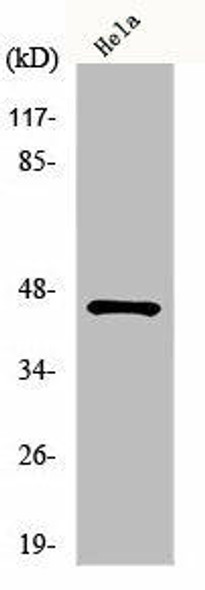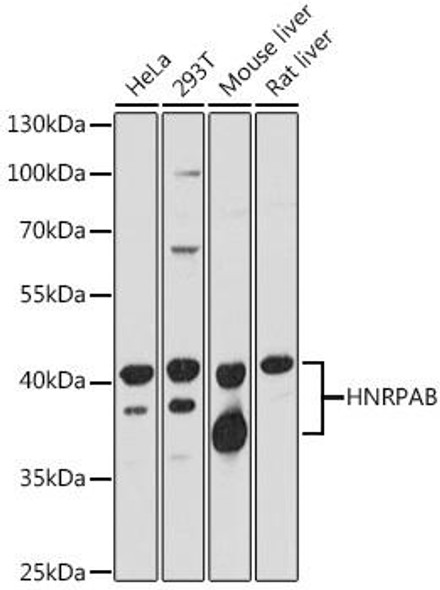Description
HORMAD1 Antibody (PACO37570)
The Hormad1 Polyclonal Antibody (PAC037570) is a crucial tool for research involving Hormad1, a protein involved in meiotic recombination and DNA repair. This antibody, produced in rabbits, exhibits high reactivity with human samples and is validated for use in various applications, including Western blotting. By specifically binding to the Hormad1 protein, this antibody allows for precise detection and analysis in different cell types, making it an ideal choice for studies in reproductive biology and cancer research.Hormad1 plays a critical role in meiosis, a specialized cell division process essential for sexual reproduction, as well as in DNA repair mechanisms.
Research on Hormad1 is vital for understanding genetic processes, fertility issues, and the development of potential therapeutic strategies for diseases like cancer. By investigating the function of Hormad1, researchers can gain valuable insights into its impact on reproductive health and genetic stability, paving the way for innovative approaches to tackle related disorders.
| Antibody Name: | HORMAD1 Antibody (PACO37570) |
| Antibody SKU: | PACO37570 |
| Size: | 50ug |
| Host Species: | Rabbit |
| Tested Applications: | ELISA |
| Recommended Dilutions: | |
| Species Reactivity: | Human |
| Immunogen: | Recombinant Human HORMA domain-containing protein 1 protein (201-394AA) |
| Form: | Liquid |
| Storage Buffer: | Preservative: 0.03% Proclin 300 Constituents: 50% Glycerol, 0.01M PBS, PH 7.4 |
| Purification Method: | >95%, Protein G purified |
| Clonality: | Polyclonal |
| Isotype: | IgG |
| Conjugate: | Non-conjugated |
| Background: | Plays a key role in meiotic progression. Regulates 3 different functions during meiosis: ensures that sufficient numbers of processed DNA double-strand breaks (DSBs) are available for successful homology search by increasing the steady-state numbers of single-stranded DSB ends. Promotes synaptonemal-complex formation independently of its role in homology search. Plays a key role in the male mid-pachytene checkpoint and the female meiotic prophase checkpoint: required for efficient build-up of ATR activity on unsynapsed chromosome regions, a process believed to form the basis of meiotic silencing of unsynapsed chromatin (MSUC) and meiotic prophase quality control in both sexes. |
| Synonyms: | HORMA domain-containing protein 1 (Cancer/testis antigen 46) (CT46) (Newborn ovary HORMA protein), HORMAD1, NOHMA |
| UniProt Protein Function: | HORMAD1: Plays a key role in meiotic progression. Regulates 3 different functions during meiosis: ensures that sufficient numbers of processed DNA double-strand breaks (DSBs) are available for successful homology search by increasing the steady-state numbers of single-stranded DSB ends. Promotes synaptonemal-complex formation independently of its role in homology search. Plays a key role in the male mid-pachytene checkpoint and the female meiotic prophase checkpoint: required for efficient build-up of ATR activity on unsynapsed chromosome regions, a process believed to form the basis of meiotic silencing of unsynapsed chromatin (MSUC) and meiotic prophase quality control in both sexes. 5 isoforms of the human protein are produced by alternative splicing. |
| UniProt Protein Details: | Protein type:Cancer Testis Antigen (CTA) Chromosomal Location of Human Ortholog: 1q21.3 Cellular Component: chromosome; nucleus Biological Process: blastocyst development; meiosis; meiotic DNA double-strand break formation; meiotic recombination checkpoint; meiotic sister chromatid cohesion; oogenesis; spermatogenesis; synaptonemal complex assembly |
| NCBI Summary: | This gene encodes a HORMA domain-containing protein. HORMA domains are involved in chromatin binding and play a role in cell cycle regulation. The encoded protein may play a role in meiosis, and expression of this gene is a potential marker for cancer. A pseudogene of this gene is located on the long arm of chromosome 6. Alternatively spliced transcript variants encoding multiple isoforms have been observed for this gene. [provided by RefSeq, Dec 2010] |
| UniProt Code: | Q86X24 |
| NCBI GenInfo Identifier: | 74750516 |
| NCBI Gene ID: | 84072 |
| NCBI Accession: | Q86X24.1 |
| UniProt Secondary Accession: | Q86X24,Q4G114, Q5T5I3, Q5T5I4, Q5T5I5, Q6FIC1, Q9H0K8 A6NMK2, B3KUK1, |
| UniProt Related Accession: | Q86X24 |
| Molecular Weight: | 36,676 Da |
| NCBI Full Name: | HORMA domain-containing protein 1 |
| NCBI Synonym Full Names: | HORMA domain containing 1 |
| NCBI Official Symbol: | HORMAD1 |
| NCBI Official Synonym Symbols: | CT46; NOHMA |
| NCBI Protein Information: | HORMA domain-containing protein 1 |
| UniProt Protein Name: | HORMA domain-containing protein 1 |
| UniProt Synonym Protein Names: | Cancer/testis antigen 46; CT46; Newborn ovary HORMA protein |
| Protein Family: | HORMA domain-containing protein |
| UniProt Gene Name: | HORMAD1 |
| UniProt Entry Name: | HORM1_HUMAN |









